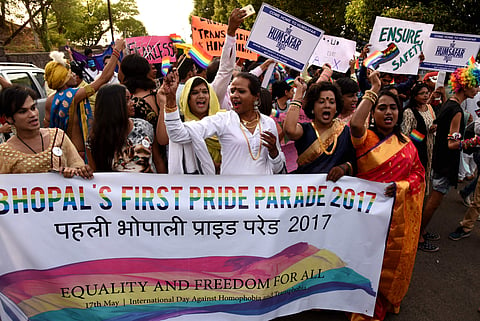

BHOPAL: Members of the lesbian, gay, bisexual, transgender and queer (LGBTQ) community on Wednesday demanded the Madhya Pradesh government to form a Transgender/Sexual Minorities Welfare Board in Bhopal on International Day against Transphobia and Homophobia.
Young members from the LGBTQ community across the country participated in ‘Bhopal Pride,’ a symbolic and colourful parade on the road in the evening for equal rights and decriminalisation of Section 377 of the Indian Penal Code (IPC).
The parade, which was a first-of-its-kind march by the LGBTQ community in central India, culminated with a colourful evening of LGBTQs near the upper lake, where Kalki Subramaniam, transgender rights activist from Chennai said “all of us should be proud of what we are, let’s celebrate instead of feeling ashamed. We should not be rejected, but instead be accepted.”
Kalki, who became the first transgender woman in India to play a lead role in mainstream Tamil film Narthagi in 2011, said “we demand from the MP CM the constitution of the Transgender/Sexual Minorities Welfare Board for taking care of our rights.”
Prior to the colourful and musical evening entailing the creative talents of members of the LGBTQ community, the Bhopal Pride walk down the lakeside road started from the Van Vihar entrance.
It evoked the participation of around 200 LGBTQ members from all across India, including Bhopal, Jabalpur, Chennai, Nagpur, Coimbatore, Delhi and Kolkata.
The parade, which has been celebrated in major cities like Mumbai, Kolkata, Delhi, Indore and Bengaluru in the past, marked at Bhopal the culmination of a series of events that started on May 13 as part of Pride Week dedicated to the LGBTQ cause.
The series of events, included panel discussions, JAM sessions, street plays on the periphery of Bhopal, besides an art exhibition titled ‘Beyond Gender and Sexuality—Artwork and Photography.
Young LGBTQ members sang songs and raised slogans throughout the Bhopal Pride parade demanding equal rights, decriminalisation of Section 377 of IPC and sought respect instead of hate from society.
“We’re not a minuscule population as told by the government, but reside in large numbers in every nook and cranny of the country. We need to come out of the closet to impress upon the government that we also deserve respect and freedom like others, which can best be possible by decriminalising the Section 377 of the IPC,” said 21-year-old Deepanshu Goswami from Delhi.
Goswami, who has participated in similar pride parades in other major cities, added that “Since I hail from a sound economic background, I’ve been accepted by my family, but it is not the case with others, who are often dubbed as Meethas and Chhakkas by their very own friends, with whom they have spent their childhood.”
A youth from Kolkata said, “We want love and not hate and torture from society. We want society and the government to allow the LGBTQs to marry as well as adopt children.”
Said Mumbai youngster Sumit Pawar, “LGBTQs are not a minuscule minority, but have existed in India since ages. All we urge society to do is to allow us live happily and free like others,” he said.
Importantly, the Supreme Court had in December 2013 overturned the Delhi High Court’s 2009 verdict that had set aside Section 377 of the IPC (unnatural sex) and decriminalised consensual sex among adult homosexuals.
At the same time, the Supreme Court had put the ball in the government’s court, arguing that it was free to annul the law through legislation.
In April 2015, the apex court in a landmark verdict had recognised transgender as a third gender in the country.